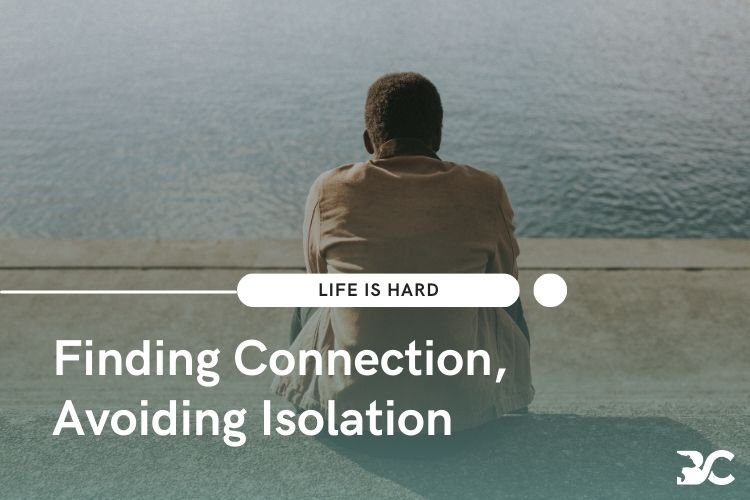Navigating Grief at Christmas
Common Pitfalls to Avoid During the Holidays
This article was written based on Bart Blair’s book, Grief Makes Christmas Complicated.
The holiday season can be a minefield of emotions when you're grieving the loss of a loved one. Christmas, with its emphasis on joy, family, and togetherness, can make the absence of your loved one feel even more pronounced. If you're facing this season with a heavy heart, know that you're not alone. Many of us have walked—or are walking—this difficult path.
While there's no "right" way to grieve, especially during the holidays, there are some common pitfalls that can make this challenging time even harder. In this post, we'll explore some of these pitfalls and offer gentle suggestions on how to navigate around them. Remember, be patient and kind with yourself as you journey through this season of grief.
“It’s OK to not be OK. But pay close attention to the choices you make so that you don’t make your situation worse.”
—Bart Blair
Don't Force Yourself to "Get Into the Christmas Spirit"
One of the biggest pressures during the holiday season is the expectation to be cheerful and festive. When you're grieving, this can feel impossible and even disrespectful to your loved one's memory. It's okay not to feel merry. Don't force yourself to participate in holiday activities if they bring you more pain than comfort.
The Bible reminds us in Ecclesiastes 3:4, "For everything there is a season... a time to weep, and a time to laugh; a time to mourn, and a time to dance." Your time of mourning is valid, even during the Christmas season.
Avoid Isolating Yourself Completely
While it's tempting to withdraw from social interactions when you're grieving, complete isolation can deepen feelings of loneliness and depression. You don't have to attend every holiday gathering, but try not to cut yourself off entirely from those who care about you.
Consider reaching out to a trusted friend or family member, or perhaps joining a grief support group. As Ecclesiastes 4:9-10 says, "Two are better than one... for if they fall, one will lift up his fellow.".
Don't Overindulge as a Coping Mechanism
The holidays often involve rich food and alcohol, and it can be tempting to overindulge as a way to numb the pain. However, excessive eating or drinking can lead to physical discomfort and potentially deepen feelings of guilt or depression.
Remember, your body is going through a lot as you grieve. Treat it with kindness. As 1 Corinthians 6:19-20 reminds us, "Your body is a temple of the Holy Spirit within you... So glorify God in your body."
Avoid Comparing Your Grief to Others'
Grief is a deeply personal experience. It's easy to fall into the trap of comparing your grief journey to others', especially during the holidays when social media is filled with images of perfect family gatherings. Remember, everyone grieves differently, and there's no "right" way to mourn.
Focus on your own healing journey rather than how others appear to be coping.
Don't Feel Guilty About Moments of Joy
If you find yourself laughing at a holiday movie or enjoying a moment with friends, don't feel guilty. Experiencing moments of joy doesn't mean you've forgotten your loved one or that you're grieving "wrong." These moments of lightness are natural and can be healing.
Allow yourself to experience these moments without guilt. As Psalm 30:5 reminds us, "Weeping may tarry for the night, but joy comes with the morning."
Avoid Ignoring Your Needs in Favor of Others'
During the holidays, you might feel pressure to meet others' expectations or to maintain traditions for the sake of family members, especially children. While considering others is important, don't ignore your own needs in the process.
It's okay to set boundaries and to ask for help when you need it. Jesus himself took time for solitude and rest when he needed it.
Don't Neglect Your Physical Health
Grief can be physically exhausting, and the busyness of the holiday season can add to this strain. Don't neglect your basic needs like getting enough sleep, eating regular meals, and staying hydrated.
Physical self-care is an important part of the grieving process.
Avoid Suppressing Your Emotions
It might seem easier to put on a brave face and push your feelings aside, especially during family gatherings or holiday events. However, suppressing your emotions can lead to increased stress and delayed healing.
Allow yourself to feel and express your emotions in healthy ways. This might mean stepping away for a quiet moment, journaling, or talking with a trusted friend. The Psalms are full of honest expressions of grief and pain, showing us that it's okay to be real with our emotions.
Don't Feel Pressured to Maintain All Holiday Traditions
Some holiday traditions might feel too painful without your loved one. It's okay to skip or modify traditions that are too difficult. You might even consider creating new traditions that honor your loved one's memory.
Be open with your family about what you can and can't handle this year.
Avoid Neglecting Your Spiritual Needs
For many, faith can be a source of comfort and strength during times of grief. Don't neglect your spiritual needs during this time. Whether it's through prayer, reading scripture, or attending a church service, connecting with God can provide solace and hope.
Remember the comforting words of Psalm 34:18, "The Lord is near to the brokenhearted and saves the crushed in spirit."
Navigating grief during the holiday season is a challenging journey, but by avoiding these common pitfalls, you can create space for healing and even moments of peace. Remember, there's no perfect way to handle grief, especially during Christmas. Be patient with yourself, allow yourself to feel what you feel, and don't hesitate to reach out for support when you need it.
May you find moments of comfort and peace this holiday season, even in the midst of your grief. As you walk through this valley, may you feel the truth of Psalm 23:4, "Even though I walk through the valley of the shadow of death, I will fear no evil, for you are with me; your rod and your staff, they comfort me."
Grief Makes Christmas Complicated
Finding Hope in the Holidays After the Loss of a Loved One
Check out this article if you find yourself in need of more relational connections.




